Religion
/Health
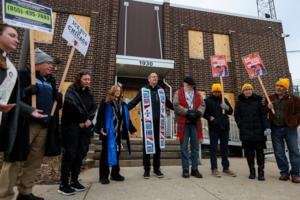
Faith leaders denied access to pray in Broadview ICE facility on Christmas Eve
CHICAGO — Chicago faith leaders were once again denied entry to pray inside the U.S. Immigration and Customs Enforcement facility in suburban Broadview. This time, on Christmas Eve.
A handful of faith leaders and other community members walked up to the facility doors at 1930 Beach St. on Wednesday morning to pray with detainees inside the ...Read more
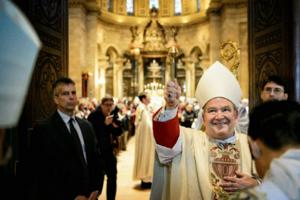
Archbishop: ICE agents don't plan to raid churches over holidays
MINNEAPOLIS — Immigration enforcement officers have told religious leaders they won’t raid Minnesota’s churches this holiday season, the state’s highest ranking Catholic leader said.
Local Department of Homeland Security (DHS) officials told the archdiocese they have no intention of entering churches and schools unless there is an ...Read more
Pittsburgh Presbytery fundraiser will eliminate medical debt for thousands across Allegheny County
PITTSBURGH — More than $14 million in outstanding medical debt will be wiped out for thousands across Allegheny County after churches in the Pittsburgh Presbytery took part in a fundraiser to purchase and eliminate the debt.
Over the past few months, congregants of more than 100 Presbyterian churches donated nearly $75,000 as part of a ...Read more

How the fallout from a Pa. chaplain's sermon inspired the Trump administration to investigate 'anti-Christian bias'
PHILADELPHIA — Russell "Rusty" Trubey said he was compelled by God to preach the words that helped set off a national battle over religion at the U.S. Department of Veterans Affairs.
Reading from a sermon titled "When Culture Excludes God," Trubey, an Army Reserve chaplain, sermonized to a congregation of veterans at the Coatesville VA ...Read more

Florida Catholic leaders ask Trump, DeSantis to pause immigration arrests
MIAMI — Roman Catholic Church leaders are making a plea to President Donald Trump and Florida Gov. Ron DeSantis to halt all immigration deportation efforts through the holiday season.
Speaking on behalf of the Bishops of the Catholic Church in Florida, Archbishop Thomas Wenski — Miami’s top Catholic leader — appealed to officials to ...Read more
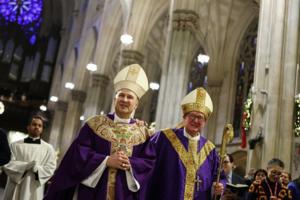
Pope Leo XIV names Illinois Bishop Ronald Hicks as archbishop of New York
CHICAGO — Pope Leo XIV made his most important U.S. appointment to date Thursday, naming a fellow south suburbanite as the next archbishop of New York to lead one of the biggest archdioceses as it navigates relations with the Trump administration and its immigration crackdown.
Joliet Bishop Ronald Hicks will replace the retiring Cardinal ...Read more

Pope Leo XIV names Bishop Ronald Hicks as new archbishop of New York
Pope Leo XIV has announced fellow Chicagoan, Bishop Ronald Hicks of Joliet, Ill., will serve as the next archbishop of New York, replacing Cardinal Timothy Dolan, who has led the state’s 2.8 million Catholics for more than 15 years.
“I am grateful to Pope Leo for appointing such a splendid priest and bishop to serve you, and have pledged to...Read more

Candidates from the clergy see role for religion in Democratic Party
WASHINGTON — In an Iowa swing district, Democrat Sarah Trone Garriott recounts how her work as a hospital chaplain and a Lutheran minister set her on a path to public service.
In deep-red Alaska, the Rev. Matt Schultz says his run as a Democrat for the state’s at-large House seat is part of his calling to “feed the hungry, comfort the ...Read more

NC Sen. Ted Budd voices blunt concerns about Mark Walker nomination
Sen. Ted Budd offered an unusually blunt stance on a former lawmaker and fellow North Carolina Republican after allegations surfaced that Budd was blocking the Senate confirmation hearing of former Rep. Mark Walker to oversee international religious freedom.
Budd told McClatchy in an exclusive interview Wednesday that he’s not blocking ...Read more
Who is Ron Hicks, the Illinois bishop who could become next archbishop of New York?
NEW YORK — Bishop Ronald Hicks of Joliet, Illinois, has reportedly been tapped to serve as the next archbishop of New York, replacing Cardinal Timothy Dolan after more than 15 years leading the nation’s second-largest archdiocese.
Pope Leo XIV is expected to appoint Hicks with an announcement as early as Thursday, sources with direct ...Read more

NC Sen. Thom Tillis says it's time to move on from Trump-nominated Mark Walker
WASHINGTON — Sen. Thom Tillis said Tuesday he believes that the Senate needs to move on from the nomination of former Rep. Mark Walker for ambassador-at-large for international religious freedom.
Tillis’ comments to McClatchy come as Walker and his allies have put pressure on senators through social media and news outlets to get his ...Read more

Leaders of cult-like Southern California group charged with murdering missing member and a 4-year-old
LOS ANGELES — Leaders of a secretive religious group in Southern California's Inland Empire region have been charged with murder in two separate cases — the disappearance of longtime member Emilio Ghanem in Redlands and the 2010 death of 4-year-old Timothy Thomas in Colton.
Ghanem vanished in May 2023, just weeks after he decided to part ...Read more
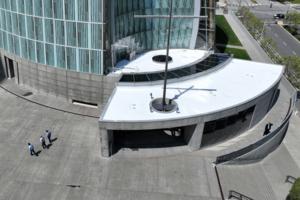
Oakland Diocese proposes new $242 million sex abuse scandal settlement
OAKLAND, Calif. — The Roman Catholic Diocese of Oakland proposed a new $242 million settlement with hundreds of parishioners who claim they were sexually abused for years at the hands of local clergy, a plan that drew immediate pushback from the victims’ attorneys, who say it doesn’t go far enough.
The proposal, filed Thursday in U.S. ...Read more
Leaders of secretive California religious group accused of murder after members vanish
LOS ANGELES — Two leaders of a group described as “cult-like” by authorities in Southern California's Inland Empire region have been arrested along with a prominent member on suspicion of murder amid multiple investigations into the disappearance of two former members and the death of a 4-year-old boy many years ago.
Darryl Muzic Martin, ...Read more
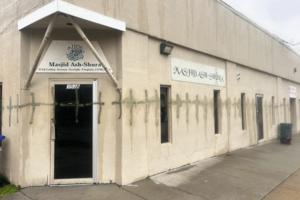
Norfolk mosque vandalized with black crosses painted on building
NORFOLK, Va. — The Masjid Ash-Shura mosque on Colley Avenue in Norfolk was vandalized between Sunday night and Monday morning with a series of black crosses spray-painted along the side of the building, but a group of volunteers quickly came together to help clean it off.
Police are in possession of a video that shows one man, at some point ...Read more

Pope Leo XIV delivers peace message to 150,000 at Beirut Mass
BEIRUT — With a rainbow adorning the early morning sky, tens of thousands converged on Beirut's waterfront on Tuesday to attend public prayers led by Pope Leo XIV — the culmination of an international debut that saw the U.S.-born pontiff repeatedly call for peace in a time of increasing war.
Addressing a crowd of an estimated 150,000 people...Read more
Minnesota faith leaders are raising the alarm on cuts to housing programs
Faith leaders will join lawmakers and housing advocates for a 12-hour vigil on Tuesday at the Basilica of St. Mary in Minneapolis to protest recent cuts from the U.S Department of Housing and Urban Development.
The “Losing Sleep, Losing Homes” vigil is urging HUD officials to reconsider their decision. The event starts at noon with speakers...Read more

Sen. Klobuchar meets Pope Leo at the Vatican with Ukrainian delegation
Minnesota Sen. Amy Klobuchar met with Pope Leo XIV on Friday at the Vatican as part of a delegation visit from Ukraine that’s asking the church to help return more than 19,000 children who have been abducted during the ongoing war with Russia.
Klobuchar said she spoke with the first American pope for 20 minutes. They talked about the missing ...Read more
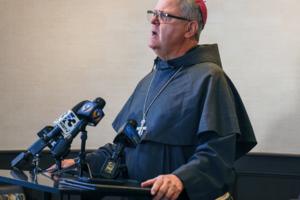
Charlotte bishop tells pope of Border Patrol raids, urges compassion for immigrants
CHARLOTTE, N.C. — As Border Patrol agents fan out of Charlotte and fear lingers from days of federal immigration enforcement across the region, Bishop Michael Martin is urging Catholics to confront the moment through the lens of faith, not politics.
Half of the diocese’s roughly 565,000 Catholics are Hispanic. Many stayed home from Mass, ...Read more
KC Catholic Diocese covered up sexual abuse by priest for decades, lawsuit says
A lawsuit filed against the Catholic Diocese of Kansas City-St. Joseph Tuesday claims the church covered up sexual abuse the plaintiff allegedly experienced as a child at the hands of a priest around 50 years ago.
The lawsuit marks one of several in recent years against the diocese alleging sexual abuse was concealed by the church, and marks ...Read more
Popular Stories
- Archbishop: ICE agents don't plan to raid churches over holidays
- Pittsburgh Presbytery fundraiser will eliminate medical debt for thousands across Allegheny County
- How the fallout from a Pa. chaplain's sermon inspired the Trump administration to investigate 'anti-Christian bias'
- Faith leaders denied access to pray in Broadview ICE facility on Christmas Eve
- Leaders of cult-like Southern California group charged with murdering missing member and a 4-year-old







